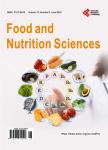Fatty Acid Treatment with Pure Omega-3 Eicosapentaenoic Acid Ethyl Ester for Patients with Cardiovascular Diseases: Differences between Branded (EPADEL®) and Generic Products
Fatty Acid Treatment with Pure Omega-3 Eicosapentaenoic Acid Ethyl Ester for Patients with Cardiovascular Diseases: Differences between Branded (EPADEL®) and Generic Products作者机构:Department of Cardiology Hokusetsu General Hospital Takatsuki Osaka Japan
出 版 物:《Food and Nutrition Sciences》 (食品与营养科学(英文))
年 卷 期:2020年第11卷第10期
页 面:887-898页
学科分类:07[理学] 0701[理学-数学] 070101[理学-基础数学]
主 题:Eicosapentaenoic Acid (EPA) Arachidonic Acid (AA) Docosahexaenoic Acid (DHA) Omega-3 Polyunsaturated Fatty Acids Branded Product Generic Product
摘 要:Background: Omega-3 polyunsaturated fatty acids (PUFAs) have some protective benefits for patients with coronary artery and cerebrovascular diseases. Eicosapentaenoic acid (EPA) drugs are prescribed as branded (B: EPADEL?) or generic products but no data exist concerning the differences in treatment outcomes between these products. Methods and Results: We investigated the differences in the serum levels of EPA, docosahexaenoic acid (DHA) and arachidonic acid (AA), and the EPA/AA ratios through blood sampling six months after daily administration of 1800 mg of EPADEL? and a generic EPA drug was initiated for 96 patients with cardiovascular diseases. All patients received these PUFA treatments while continuing with baseline therapy. After 6 months of administration, EPADEL? produced better results than the generic (G) product (EPA;baseline: 59.4 ± 25.5 μg, B: 215.5 ± 58.8 μg, G: 199.7 ± 63.8 μg, B vs G, p 0.0005;AA;base



